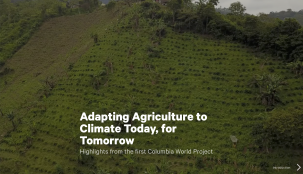Author: Francesco Fiondella4
-

Report: Major Accomplishments of the ACToday Project
ACToday aims to combat hunger and improve food security by increasing climate knowledge in Ethiopia, Senegal, Bangladesh, Vietnam, Colombia, and Guatemala.
-

Climate Scientist Ángel Muñoz Receives Early Career Award
The award from US CLIVAR) recognizes Muñoz’s ‘outstanding contributions’ to the research and applications of subseasonal-to-seasonal predictions.
-

Subseasonal Forecasting for the Indian Monsoon
Climate scientist Nachiketa Acharya uses medium-term forecasts to help Indian farmers with planning and decision-making.
-

Can We Predict ‘Climate Migrations’?
A prototype model considers climate and socioeconomic factors to see if displacements of people can be predicted and better explained.
-

New Project Will Tackle Amazonian Development Challenges From Space
The International Research Institute for Climate and Society is part of a new project that will use satellite imagery to address environment and development challenges across the Amazon Basin.
-

Bangladesh Gets a New Climate Academy
The academy will train a new generation of experts who can use climate services effectively to manage the risks and opportunities around food security in Bangladesh.
-

What’s Climate Doing to Guatemala’s Coffee?
Diego Pons discusses his recent work on exploring the relationships between several climatic variables and coffee productivity in a region of Guatemala.
-

Q&A: Forecast-Based Financing for Flash Floods
A Q&A with IRI’s Andrew Kruczkiewicz about a new mechanism for taking early humanitarian action based on weather forecast information and socioeconomic risk analysis.
-

National Climate Assessment: Threats to U.S. International Interests
John Furlow is the Deputy Director for Humanitarian Assistance and International Development of the International Research Institute for Climate and Society. He is an author of the new U.S. National Climate Assessment’s chapter on the impact climate will have on U.S. international interests. We spoke with Furlow about climate threats to trade, supply chains, national…
